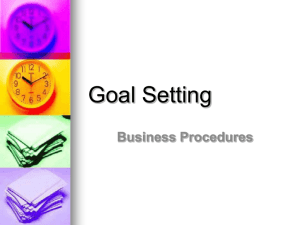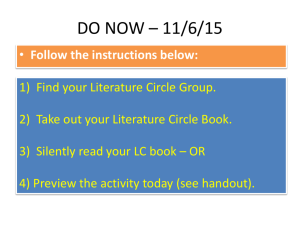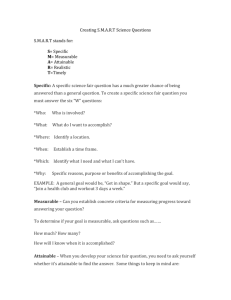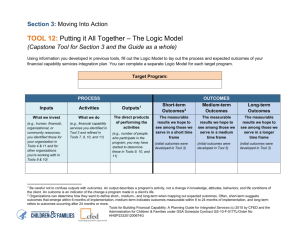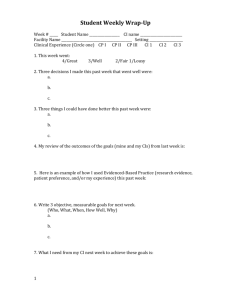Goal Setting & Self Evaluation If It's To Be, It's Up To Me!
advertisement
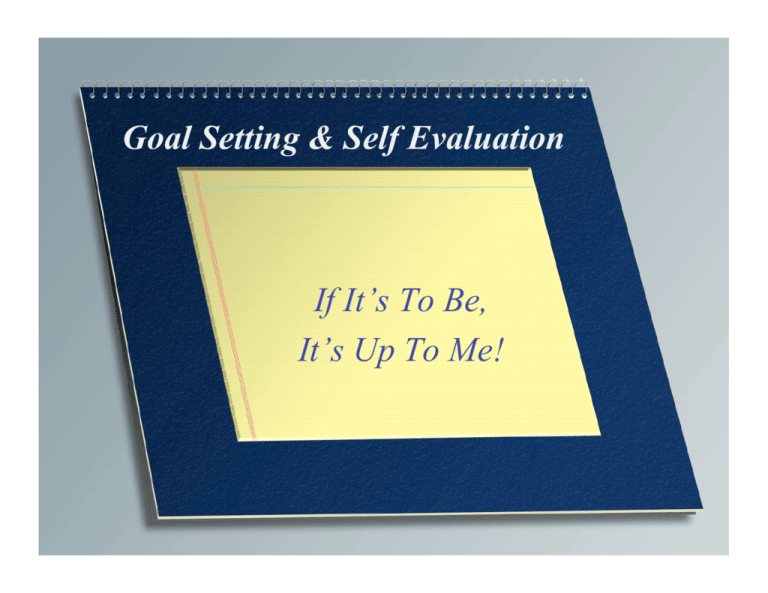
Goal Setting & Self Evaluation If It’s To Be, It’s Up To Me! • 90 % of Successful people set goals. • 90% of people who feel they have failed did not set goals. Opportunity is missed by most people because it is dressed in overalls and looks like work. ~ Thomas Edison Setting Goals • Allows you to choose where you want to go in life. • Gives you a long-term vision and short-term motivation. • Focuses your acquisition of knowledge • Helps you to organize your resources • Helps you to measure success along the way Advantages of Setting Goals • • • • Achieve more Improve performance Increase motivation to achieve Increase pride and satisfaction in achievements • Improve self-confidence • Plan to eliminate attitudes that hold you back and cause unhappiness People who use goal setting effectively… • • • • • Suffer less from stress and anxiety Concentrate better Show more self confidence Perform better Are happier and more satisfied “How to” on setting goals • What do you want to achieve in your lifetime? • There are many categories of goals – – – – Personal (family, health) Education Career Etc.. Setting Effective Goals • Express goals positively • Be precise • Set priorities – don’t be overwhelmed by too many goals • Write your goals down • Keep goals you are working towards immediately, small and achievable Some Goal Setting Principles • Set Performance, not Outcome Goals – Set goals over which you have as much control as possible – Goals based on outcomes are extremely vulnerable to failure because of things beyond your control • Base goals on personal performance or skills or knowledge to be acquired – (in a race, set a performance time, not the outcome of a win—you have control over only your own performance) • Set specific, measurable goals. – If you achieve all conditions, then you realize confidence and comfort in the achievement – If you consistently fail to achieve the goal, reassess and adjust it; analyze the reason for failure and take appropriate action to correct. • Set Realistic Goals – Avoid setting goals based on • • • • Other people Insufficient information Always expecting perfect performance Lack of respect for self – Take time for yourself to avoid burnout • Avoid setting goals too low – Fear of failure – Taking it TOO easy • After examination of the previous points, take note to set goals at reasonable levels. – Individual process – Be honest – Take pride in goal setting If you aren't making any mistakes, it's a sure sign you're playing it too safe. ~ John Maxwell Assessment • Feedback: Failure – Where you have failed to reach a goal, ensure that you learn the lessons of the failure • Did you try hard enough • Were technique, skills or knowledge faulty and need to be enhanced • Was the goal you set unrealistic • Etc… – Use this info to adjust the goal—then it becomes a positive learning experience – Trying something, even if it does not work often opens doors that would otherwise have remained closed Assessment • Feedback: Success – If goal was easily achieved, make next goals harder – If goal took a dispiriting length of time to achieve, make next goals a little easier – If you learned something that would lead you to change goals still outstanding, do so – If while achieving the goal you noticed a deficit in your skills, set goals to fix this Summary of Goal Setting • Goal Setting is an important method of – Deciding what is important for you to achieve in your life – Separating what is important for you from what is irrelevant – Motivating yourself to achievement – Building your self-confidence based on measured achievement of goals – Phrasing them positively – Defining them precisely – Prioritizing multiple goals – Writing them down – Keeping them manageable – Defining performance, not outcome If you do not already set goals, or if you have not yet focused on your life goals, now is a great time to start! Goal Setting • Take 5 – 10 minutes to quickly brainstorm on a separate piece of paper, goals that you have for yourself. • Write them all down, no matter how unlikely • Prioritize them • Take the first 5 and rewrite them into specific, realistic, measurable, performance-oriented goals. Self Evaluation • What are your weaknesses as you reflect on the goals that you have set for yourself? • How will you address these weaknesses as you strive to achieve your goals? • Where is your network of support? ***** • What are your personal strengths as you reflect on your goals? • How will you remain motivated and focused? • How will you know when you have achieved a goal? Most look up and admire the stars. A champion climbs a mountain and grabs one. ~ Unknown


